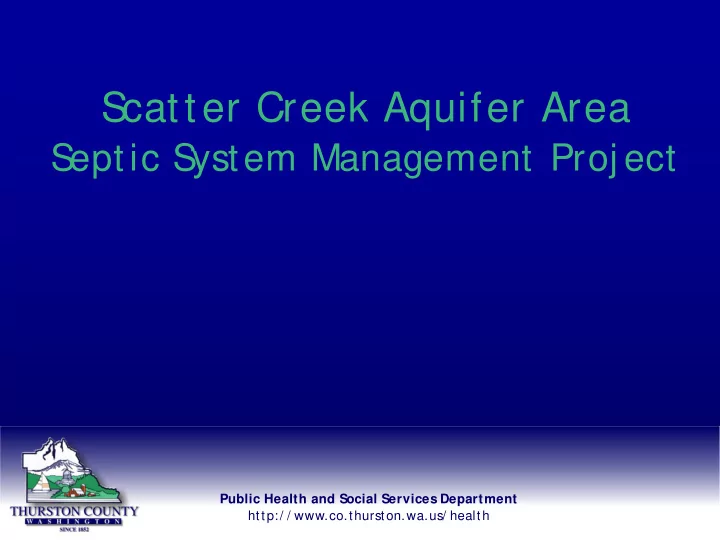

Scatter Creek Aquifer Area S eptic S ystem Management Proj ect Public Health and Social Services Department http:/ / www.co.thurston.wa.us/ health
Scatter Creek Citizen’ s Committee S Chanele Holbrook andra Adix Tom Budsberg Roger Max Dave Dafoe Bruce Morgan Karen Deal Amanda Neice Lowell Deguise, Maureen Pretell thru 6/ 4/ 14 Gene Weaver Marlene Hampton Public Health and S ocial S ervices Department http:/ / www.co.thurston.wa.us/ health
Public Health and S ocial S ervices Department http:/ / www.co.thurston.wa.us/ health
Scatter Creek Aquifer Very vulnerable groundwater supply Sole source of water for more than 1,000 public water systems and single family wells Over 18,000 people rely on the wat er Rapidly moving groundwater Public Health and S ocial S ervices Department http:/ / www.co.thurston.wa.us/ health
S catter Creek Aquifer Areas in the aquifer have been contaminated by land uses in past Policies and regulations put in place have helped protect water The area is transitioning from agricultural to rural residential Public Health and S ocial S ervices Department http:/ / www.co.thurston.wa.us/ health
Lan Land Public Health and S ocial S ervices Department http:/ / www.co.thurston.wa.us/ health
Well Monitoring Network
Monitoring Indicators Coliform Bacteria Other contaminants S could be present tandard – none Viruses Nitrates Pharmaceuticals S tandard 10 mg/ l Pesticides Precautions at 5 mg/ l Public Health and S ocial S ervices Department http:/ / www.co.thurston.wa.us/ health
Monitoring Results … good news, bad news, and good news S ince 2008 nitrate levels have dropped throughout the aquifer Oct 2013 sampling – nitrate levels rose in many wells (one by 3mg/ l) and some unsatisfactory coliform bacteria samples March 2014 nitrates down - Overall trend is a decrease in nitrates Public Health and S ocial S ervices Department http:/ / www.co.thurston.wa.us/ health
Nitrate in mg/L 8.00 7.4 7.00 6.3 6.00 5.7 Nitrate mg/L 5.00 4.7 Average 4.00 3.8 3.7 3.6 Maximum 3.3 Minimum 3.00 2.7 2.5 2.2 2.2 2.00 1.3 1.2 1.00 0.9 0.9 0.9 0.5 0.00 2009 2010 2011 2012 2013 2014 Year
Public Health and S ocial S ervices Department http:/ / www.co.thurston.wa.us/ health
Septic System Management Focus of this proj ect was looking at the impacts of septic systems on the aquifer. Opportunity to examine future impacts and take action to protect safe drinking water Public Health and S ocial S ervices Department http:/ / www.co.thurston.wa.us/ health
COMPUTER MODELING Worse- Case S cenario Public Health and S ocial S ervices Department http:/ / www.co.thurston.wa.us/ health
6 th Model S cenario Full build-out, lawn fertilizer, Tenino full capacity
Citizen’ s Committee Conclusions The aquifer is vulnerable to contamination from septic systems and land use activities. Nitrogen levels in the aquifer have decreased over time and seem to be trending lower. Current aquifer conditions and worse-case predictions do not warrant taking regulatory action at this time. The groundwater model predicts that average nitrate concentrations in even the most vulnerable part of the study area will be less than half the maximum contaminant level of 10 mg/ l. Public Health and S ocial S ervices Department http:/ / www.co.thurston.wa.us/ health
Citizen’ s Committee Conclusions The committee wants to be cautious and monitor water quality so, if needed, we can take action before it is too late. Ideally monitoring should: evaluate trends, the accuracy of the computer model, water quality in the deeper aquifer, the extent and duration of water quality spikes, chemicals of emerging concern, and pathogens such as viruses . Public Health and S ocial S ervices Department http:/ / www.co.thurston.wa.us/ health
Citizen’ s Committee Conclusions In general, zoning, land use and health regulations have protected the aquifer from nitrate and many other contaminants. However, health and land use regulations can be strengthened to help assure the optimal placement of new septic systems and wells to minimize the potential for contaminating drinking water supplies. The committee believes that with proper information, education, and incentives, area residents will be good stewards and take action protect the aquifer. Public Health and S ocial S ervices Department http:/ / www.co.thurston.wa.us/ health
Recommendations Public Health and S ocial S ervices Department http:/ / www.co.thurston.wa.us/ health
FLOW FLOW FLOW Public Health and S ocial S ervices Department http:/ / www.co.thurston.wa.us/ health
FLOW FLOW FLOW Public Health and S ocial S ervices Department http:/ / www.co.thurston.wa.us/ health
Well Public Health and Social Services Department http://www.co.thurston.wa.us/health
Well Public Health and Social Services Department http://www.co.thurston.wa.us/health
Well Public Health and Social Services Department http://www.co.thurston.wa.us/health
Public Health and S ocial S ervices Department http:/ / www.co.thurston.wa.us/ health
Public Health and S ocial S ervices Department http:/ / www.co.thurston.wa.us/ health
Public Health and S ocial S ervices Department http:/ / www.co.thurston.wa.us/ health
Public Health and S ocial S ervices Department http:/ / www.co.thurston.wa.us/ health
Public Health and S ocial S ervices Department http:/ / www.co.thurston.wa.us/ health
Public Health and S ocial S ervices Department http:/ / www.co.thurston.wa.us/ health
Funding Strategy 1. S eek grants where appropriate 2. Use existing stormwater fees 3. S eek funding from partners 4. Use septic fees Public Health and S ocial S ervices Department http:/ / www.co.thurston.wa.us/ health
Coming Up Final Recommendations presented to Board of Health: November 6, 2014 Public Health and S ocial S ervices Department http:/ / www.co.thurston.wa.us/ health
Proj ect Website: www.co.thurston.wa.us/ health/ ehsc 360-867-2582 Public Health and S ocial S ervices Department http:/ / www.co.thurston.wa.us/ health
Recommend
More recommend